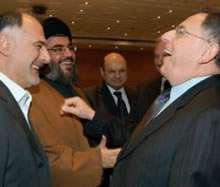
The damage done by the Israeli Air Force, Naval and artillery strikes against Lebanon appears to be formidable. Targets struck include numerous bridges, a power station and the runways of the Beirut International Airport. Civilians have also been hit. I've surveyed some of the Lebanese blogs that I read frequently, and many people were venting their anger at Hizbullah and Nasrallah, especially for the timing. It is not only Maronite Christians who are upset. The tourist season in Lebanon is in full swing and many Lebanese have been expecting to reap the dividends of the recovering tourist industry, which has been buoyed by Arab tourists from the Gulf and Saudi Arabia as well as westerners. Of course, the strikes are not endearing Israel to the Lebanese public, either. On his blog From Beirut to the Beltway, Abu Kais, a Lebanese American, who is, incidentally, a Shi'a, expresses his frustration with Hizbullah and Israel. His biggest complaint against Israel is that it is cowardly to beat up on Lebanon instead of attacking Syria or Iran.
From the perspective of Israeli decision-makers, however, the raids against Lebanon make perfect sense. Israel is sick of having to deal with non-state actors that are not beholden to the limits and types of calculations that usually restrain states. The Lebanese government has to be held responsible for its dilly-dallying on Hizbullah. Lebanese politicians have been engaged in a "National Dialogue" for months now and many hoped that this talk-shop would somehow result in the disbandment of Hizbullah. Nothing of that sort has happened. Instead, Lebanon's domestic political scene seemed totally paralyzed. Nothing was done to capitalize on the Syrian withdrawal in order to pressure Hizbullah, in the same way that nothing has been done since the Israeli withdrawal from Lebanon in 2000. Lebanese politicians have to wake up and start acting like leaders. The big fear among Lebanese was that provoking or cracking down on Hizbullah would result in renewal of a civil war. But is that an excuse for wasting time and not addressing the continued operation of a foreign-backed militia on your sovereign territory?! Is it better to allow Hizbullah to continue operating with impunity, to bring more missiles to southern Lebanon and to continue arming itself? The longer Lebanon waits, the more difficult it will become to pressure Hizbullah to do anything. Nasrallah knows this very well. The attack on Israel and the kidnapping of Israeli soldiers was a move to make his movement more popular among Lebanese Shi'a and perhaps among the Palestinians. Every time Hizbullah succeeds, its position vis-a-vis the state of Lebanon is strengthened.
Perhaps the Lebanese military and its leaders lack the material wherewithal and the political will to take on Hizbullah. In that case, they do not really deserve to be in charge of their country. If you cannot maintain a monopoly of force, if you cannot exercise your sovereign control over your territory, then you're not really a state and you need someone else to take care of business on your own territory, and that really sucks.
What is most unfortunate about all of this is that the Middle East has been through it all. Israel went to war against Egypt in 1956 partly because of the support that Egypt provided to Palestinian "fedayeen" irregulars who attacked civilians in Israel from the Gaza Strip. Israeli retaliations against Egyptian targets arguably led Egyptian leader Gamal 'abd al-Nasir to rein in the Palestinian militias. In Jordan, the Palestinians acted with more impunity and Israel also retaliated against Jordanian targets in the West Bank and not just the Palestinian guerillas. King Hussein also had to juggle his fears of domestic unrest (from Jordan's Palestinian population) and fear of Fatah with the need to forestall Israeli retaliation attacks. Hussein, to his credit, acted in September 1970 to save the Hashemite Kingdom of Jordan from overthrow at the hands of Fatah/the PLO. The comparison only goes so far, because Hizbullah is Lebanese and is therefore not considered an outside force, but the fact that it is backed by Syria and Lebanon makes it no less of a foreign agent.
No comments:
Post a Comment